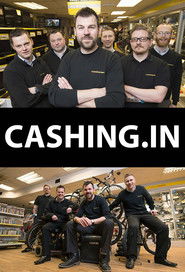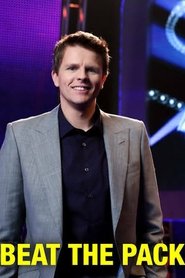Bbc One TV Series - Page 119
-
South East Today
0000
South East Today
0000
BBC South East Today is the BBC South East regional television news programme, serving Kent and East Sussex. Prior to its launch on 3 September 2001, most of the viewers in the region received Newsroom South East, though some had been receiving South Today. South East Today is produced and broadcast live from the BBC's South East broadcasting studios in Royal Tunbridge Wells with district reporters based at newsrooms in Brighton, Chatham, Dover and Hastings. -
That's Genius!
0000
That's Genius!
0000
That's Genius! was a BBC children's television series originally shown on BBC One between 12 November 2003 and 17 December 2003. The program ran for one series. Earlier in 2003 CBBC announced a competition for children to send in their ideas for inventions. The competition attracted nearly 3000 entries of which a panel of judges chose the top five. These five inventions were then made into prototypes by experts. On 17 December 2003 viewers were invited to vote for their favourite invention and then the winner was announced live on BBC One. The winner won a behind the scenes tour at the Epcot Center. The show was presented by Angellica Bell, Kursty Groves and Steve Wilson. -
BBC Nine O'Clock News
0000
The BBC Nine O'Clock News was the flagship BBC News programme. It was launched on 14 September 1970 and ran until 15 October 2000, when it was controversially replaced by the BBC Ten O'Clock News. -
Nairn at Large
1969
Nairn at Large
1969
In these six programmes Ian Nairn looks at industrial landscape; considers the unique appeal of Liverpool; tries to analyse the attraction of a summer Bank Holiday county like Cornwall; asks if in new towns like Cumbernauld people have been given enough say in their environment; sees the potential in a plan for a Welsh hill-town; and finally takes a look at a uniquely British institution - the public house. -
Cashing In
2015
Cashing In
2015
Cashing In follows a year in the lives of the staff and customers of Cash Converters, the biggest second-hand retailer and pawnbroker in the world. The most extreme retailers on the high street need to turn a profit which means selling everything from TVs and expensive guitars to mobility scooters and hoovers as well as dealing with fraudsters, shoplifters and customers desperate to raise every penny they can. -
Beat the Pack
0000
Beat the Pack
0000
Beat the Pack is a BBC quiz show that aired on BBC One since 4 March 2013, hosted by Jake Humphrey. -
Britain's Favourite Supermarket Foods
0000
Britain's Favourite Supermarket Foods is a British documentary series which was first broadcast on BBC One on 15 February 2012 as a one-off special. The programme returned on 18 July 2013 and aired for two episodes. Presented by Cherry Healey, the programme investigates some of the UK's favourite supermarket foods, revealing their secrets and unexpected powers. -
Eureka
0000
Eureka
0000
Eureka is a British educational television series about science and inventiveness which was produced and broadcast by the BBC from 1981 to 1986. Devised and written by Clive Doig and Jeremy Beadle, the series told the stories behind the inventions of commonplace objects. -
Stay Tooned!
0000
Stay Tooned!
0000
Stay Tooned is a series presented by Tony Robinson, in which he discusses in more details and explains in some depth about cartoon characters, the people behind the cartoons, studios, and also looks over the history as well. Unlike Rolf Harris - Cartoon Time, in which he performed as filler between the cartoons, Tony Robinson tried to provide greater details about the particular topic which he would focus on each week. This meant that he range of depth of the series grow far wider that just run of the mill classics, and on occasions featured more obsure cartoons including Betty Boop, Animal Farm, and one made by independent producers . -
The Street That Cut Everything
0000
The Street That Cut Everything is a British television documentary presented by BBC political editor Nick Robinson. Billed as a social experiment, 50 residents of a street in Preston, Lancashire were persuaded to go without all council services for six weeks, and work together to run their own community with the aid of the Council Tax rebates they received for not having local authority services. One of the film's objectives was to highlight the issue of cuts in public spending, but the programme attracted criticism for the nature in which the experiment was conducted. One major point of concern involved dogs being allowed to excessively foul the street, which the residents were then required to clean up, something which raised public health concerns. The programme was aired in two episodes on Monday 16 May 2011. -
Rough Justice
0000
Rough Justice
0000
Rough Justice was a BBC television series which investigated alleged miscarriages of justice. It was broadcast between 1982 and 2007, and played a role in securing the release of 18 people involved in 13 cases involving miscarriages of justice. The programme was similar in aim and approach to The Court of Last Resort, the NBC TV series that aired in the US between 1957 and 1958. It is credited with contributing to the establishment of the Criminal Cases Review Commission in 1997. Rough Justice was cancelled in 2007 due to budget restraints, leading to criticism from the media as the announcement came just as the BBC launched an £18 million Gaelic-language channel which would serve only 86,000 viewers. -
The Planners Are Coming
2008
The Planners Are Coming was a British fly on the wall documentary television series broadcast on BBC One in 2008 and 2009. It followed council Planning Officers and Enforcement Officers as they dealt with planning applications and enforced planning regulations in cases where planning permission had not been sought. Council planning departments featured in the programme include those of Braintree in Essex and Barking & Dagenham, Barnet and Brent in London. In 2008, the first four episodes were shown in an 8pm slot, with the remaining four episodes airing in 2009 at the later time of 10:35pm. The series has also been broadcast on The LifeStyle Channel in Australia. When the programme was first announced by the BBC in June 2007, the working title was The Planners, but this was later changed to The Planners Are Coming. In 2013, a similar documentary series called The Planners began on BBC Two. -
Tourettes: I Swear I Can't Help It
0000
Tourettes: I Swear I Can't Help It is a QED documentary made by the BBC in 2009. -
The Foxtrot
0000
The Foxtrot
0000
The Foxtrot is a television play by Rhys Adrian, first broadcast on BBC One in 1971 as part of the Play for Today strand. It is notable as an early example of the series' departure from socially aware, issue-based drama towards comedy and non-naturalism. -
Decade of Doctors
0000
Decade of Doctors
0000
Decade of Doctors is a series of five-part, five-minute episodes broadcast after the main showing of the BBC daytime soap opera, Doctors, to celebrate the 10th anniversary of the series. -
On the Spot
2000
On the Spot
2000
On the Spot is a BBC National Lottery game show that was broadcast on BBC One from 29 July 2000 to 2 September 2000. The programme was hosted by Des O'Connor. -
The Truth About Crime
2009
The Truth About Crime is a British television documentary series inspired and presented by Nick Ross in association with the film-maker Roger Graef, executive producer Sam Collyns and series producer Alice Perman. It was first broadcast on BBC One in July and August 2009. -
Star for a Night
0000
Star for a Night
0000
Star for a Night was a British television singing competition. It was originally commissioned for a pilot on 26 June 1999. This did very well in the ratings and it soon was commissioned as a series that ran from 8 January 2000 to 20 October 2001. It was presented by Jane McDonald. The judges were Nigel Martin Smith and Barbara Windsor. -
First Class
0000
First Class
0000
First Class was a 1980s BBC TV game show hosted by Debbie Greenwood. The show was broadcast on Friday evenings on BBC 1 and ran for at least three series. Two teams of three students would take part in a multi-format quiz featuring questions on both general knowledge and popular culture, as well as innovative video game rounds. Rounds such as the "Spinning Gold Disc" made use of a simulated computer display similar to other game shows of the same era, such as Blockbusters and Catchphrase. Other rounds such as "Word of Mouth" used a real computer display from a BBC Micro. This computer also provided the on-screen captions and scores and was nicknamed Eugene, after the show's original programmer Eugene Crozier. The competition was a knockout tournament; the eventual winners of the series would be presented with a computer for their school. Celebrity episodes of the show were also aired, featuring cast members from Grange Hill and EastEnders. First Class was notable for its use of video games; such footage was a rar


